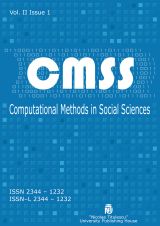Modelling in happiness economics
Modelling in happiness economics
Author(s): Raluca IorgulescuSubject(s): Economy, Human Resources in Economy, ICT Information and Communications Technologies, Socio-Economic Research
Published by: Universitatea Nicolae Titulescu
Keywords: Modelling in happiness economicshappiness economics; Easterlin paradox; welfare; well-being; model
Summary/Abstract: In modern times, in the context of an increasingly quantitative approach to economics, welfare has been related mostly to an economic actor’s income. With increasing complexity in social and economic life, studies moving beyond the income approach to welfare enriched economic literature. Modelling the economic concept of ‘happiness’ is one of the new ways to design welfare policy. Even if it has been shown, using econometric techniques, that an accurate measurement of the true welfare effects is not possible, researchers estimated, for example, the income required for a typical individual in different countries to ascertain the same change, due to various events, in declared happiness as in welfare. This paper introduces the concept of happiness as one of the measures of well-being in economics and presents a brief survey of the literature on this topic.
Journal: Computational Methods in Social Sciences
- Issue Year: 2/2014
- Issue No: 1
- Page Range: 35-41
- Page Count: 7
- Language: English

